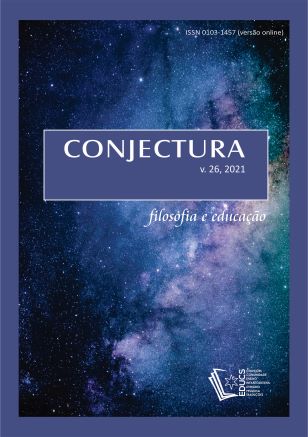Reconhecimento, consenso, realização, dignidade e pessoa moral: algumas categorias importantes para o entendimento do agir ético e da vida ética segundo Lima Vaz
DOI:
https://doi.org/10.18226/21784612.v26.e021035Abstract
O presente artigo tem o objetivo de analisar algumas categorias importantes da ética de Lima Vaz, tais como: reconhecimento, consenso, realização, dignidade e pessoa moral, a fim de provar a ideia de que não há agir ético na comunidade ética senão reconhecendo que os sujeitos éticos precisam reconhecer, reciprocamente, a dignidade de todo ser humano e consentir na busca do Bem. Para tanto, objetiva-se articular o texto em três momentos: primeiro, busca-se argumentar que o ser humano, como ser estrutural (ser-em-si) e ser relacional (ser-para), quer realizar-se como tal; segundo, trata-se de mostrar que o agir ético se efetiva dialeticamente, no seio e na vida da comunidade, que assume como fim (telos) o horizonte do Bem no qual o sujeito ético alcança sua realização; e, terceiro, apresentar a categoria de pessoa moral como o coroamento da ética de Lima Vaz, uma vez que realizar a própria vida supõe, fundamentalmente, um apelo ao ser humano para se tornar, no plano do dever ser, ou seja, no plano da ética, aquilo que já é no plano ontológico, a saber, pessoa.
Palavras-chave: Lima Vaz. Consenso. Realização. Dignidade. Pessoa moral.
Literaturhinweise
REFERÊNCIAS
BOFF, Clodovis. O livro do sentido. Qual é, afinal, o sentido da vida (parte teórico-construtiva). Volume II. São Paulo: Paulus, 2018.
HERRERO, Francisco Javier. A Ética Filosófica de Henrique Cláudio de Lima Vaz. Síntese. V 39, Nº 125, 2012: pp. 393-432.
LIMA VAZ, Henrique Cláudio de. Antropologia Filosófica I. São Paulo: Loyola, 1991.
LIMA VAZ, Henrique Cláudio de. Antropologia Filosófica II. São Paulo: Loyola, 1992.
LIMA VAZ, Cláudio Henrique de. Escritos de filosofia II: Ética e cultura. São Paulo: Loyola, 1993. (EF II)
LIMA VAZ, Cláudio Henrique de. Escritos de filosofia V:Introdução à Ética Filosófica II. São Paulo: Loyola, 2000. (EF V)
OLIVEIRA, Cláudia Maria Rocha de. Metafísica e Ética: a filosofia da pessoa em Lima Vaz como resposta ao niilismo contemporâneo. São Paulo: Loyola, 2013.
OLIVEIRA, Cláudia Maria Rocha de; CARDOSO, Delmar. Ação ética intersubjetiva na ética filosófica de Lima Vaz. Síntese. V 35, Nº 113, 2008: pp. 405-422.
RIBEIRO, Elton Vitoriano. Reconhecimento ético e virtudes. São Paulo: Loyola, 2012.
RIBEIRO, Elton Vitoriano. A categoria da justiça: momento fundamental de realização da comunidade humana como comunidade ética segundo Lima Vaz. Argumentos. Ano 3, Nº 6, 2011: pp. 70-78.
SOUSA, Maria Celeste de. Comunidade Ética: reconhecimento, consenso e sociedade em Henrique Cláudio de Lima Vaz. São Paulo: PUC-SP, 2009. 238 f. Tese (Doutorado em Filosofia) – Programa de Pós-Graduação em Filosofia, Pontifícia Universidade Católica de São Paulo, São Paulo, 2009.
Downloads
Veröffentlicht
Zitationsvorschlag
Ausgabe
Rubrik
Lizenz
1. A publicação dos originais implicará a cessão dos direitos autorais à revista Conjectura.
2. Os textos não poderão ser reproduzidos sem autorização da revista depois de aceitos.

Este trabalho está licenciado com uma Licença Creative Commons - Atribuição 4.0 Internacional.









